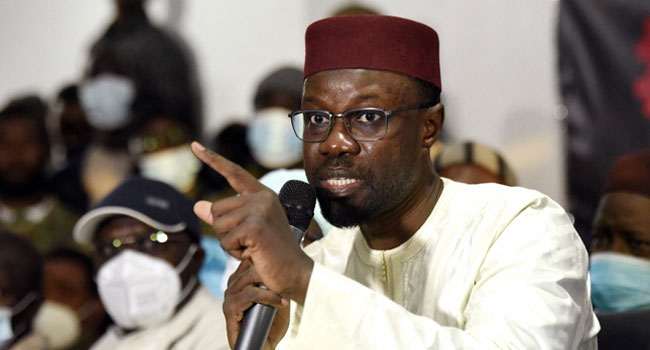In a bold move that has shaken the political landscape of Senegal, jailed opposition leader Ousmane Sonko has submitted his candidacy for the forthcoming presidential election, scheduled for February. This extraordinary step, taken in the face of governmental resistance to providing essential documentation, highlights a significant challenge to the status quo in Senegalese politics.
The developments around Sonko’s candidacy submission have brought to the forefront the complexities of Senegal’s political system. Despite being incarcerated, Sonko, through his legal representatives, has steadfastly pursued his right to stand in the election. The move was confirmed by Ousseynou Ly, an official of the Pastef party, which has recently been dissolved under controversial circumstances.
The situation around Sonko’s candidacy became particularly tense last week. The National Electoral Entity, responsible for managing elections in Senegal, did not furnish Sonko’s team with the required documents to file for candidacy. This prompted his legal team to proceed with the submission nonetheless, placing their faith in the justice system’s impartiality.
Sonko’s lawyer, Said Larifou, expressed optimism during a press conference in Paris. “We are certain that his candidacy will be accepted and validated,” Larifou stated, emphasizing the Constitutional Council’s judicial independence from political influence.
Sonko’s legal troubles began with a conviction on June 1 for corrupting minors, a charge he faced in absentia, having refused to attend the trial. Since late July, Sonko has been imprisoned on several other charges, including incitement to insurrection, conspiracy with terrorist groups, and compromising state security. These charges, which Sonko has consistently denied, are seen by many as an attempt to preclude him from challenging incumbent President Macky Sall in the upcoming election.
In a significant judicial development in mid-December, a judge ordered Sonko to be reinstated on the list of presidential candidates. This decision reinforced a lower court’s ruling that had been overturned on the first appeal, adding another layer of complexity to the unfolding political drama.
Simultaneously, Bassirou Diomaye Faye, Sonko’s backup and fellow inmate, has also filed to run for president, representing the now-defunct Pastef party. This move underscores the party’s resolve to remain a key player in the national political arena despite the legal and administrative challenges it faces.
In another twist to the evolving political narrative, former Prime Minister Aminata Toure, who previously allied with President Sall but has since joined the opposition, declared her intention to enter the presidential race.
As Senegal inches closer to its presidential election, the situation surrounding Sonko’s candidacy from prison poses a critical test for the nation’s democratic principles. It not only challenges the legal framework but also puts the spotlight on the intricate relationship between law, governance, and political contestation in a country navigating the complexities of maintaining a robust and equitable democratic process.
The Constitutional Council’s impending decision on Sonko’s eligibility is highly anticipated, with potential far-reaching consequences for Senegal’s political future. This episode in Senegal’s political history is a vivid illustration of the ongoing struggle for democratic integrity and the rule of law in the face of political adversity.





